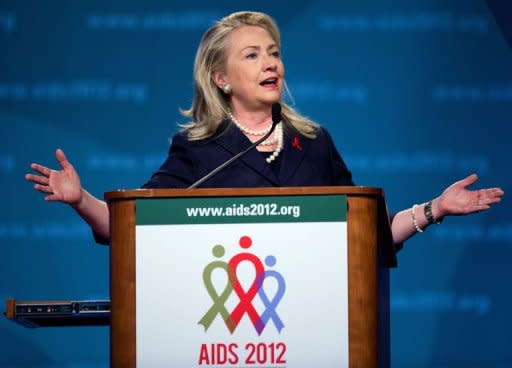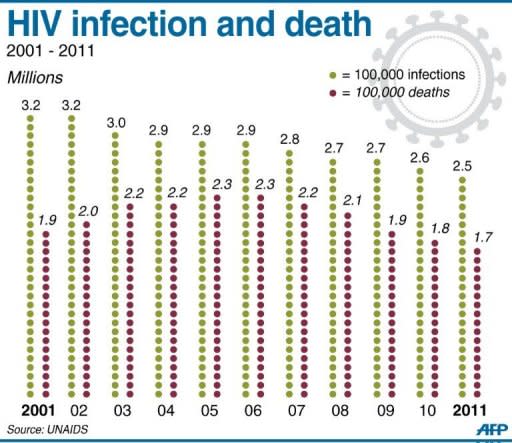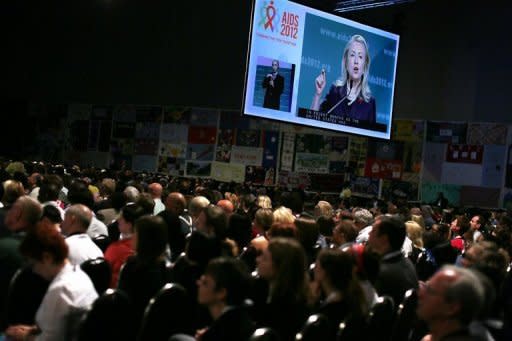US committed to AIDS-free generation: Clinton
US Secretary of State Hillary Clinton vowed Monday that the United States will step up the fight against HIV, insisting it was working towards the goal of achieving an AIDS-free generation. Amid worrying research showing that resistance to AIDS drugs is growing in parts of Africa, Clinton unveiled more than $150 million in new funding to battle the pandemic. "The United States is committed and will remain committed to achieving an AIDS-free generation. We will not back off, we will not back down," Clinton told participants at the International AIDS Conference in Washington. "We will fight for the resources necessary to achieve this historic milestone," she added, dismissing criticism that the United States was not serious in its bid to fight the 30-year pandemic. Some 1.5 million people died from the disease last year, and some 34 million people globally are living with HIV, according to the latest UNAIDS report. However, about one in five people are not aware of their status and are most at risk of spreading the disease. Clinton said people and governments had to break the chain of transmission, urging men to have voluntary circumcisions and calling for HIV-positive pregnant women to get the right treatment to spare their babies from infection. "This is a fight we can win. We have already come so far, too far to stop now," she said, drawing loud applause and cheers from the audience. In an AIDS-free generation, almost no child would be born with HIV, adults would be at a lower risk of becoming infected, and if they get HIV they would have treatment to stop them developing AIDS and passing it on, she said. The 19th International AIDS Conference is expected to draw 25,000 people, including politicians, scientists, activists and HIV sufferers. Held every two years, the conference has returned to the United States for the first time since 1990, after being kept away by laws that barred people with HIV from traveling to the country. The ban was lifted in 2009. US President Barack Obama has faced some criticism for deciding not to attend, but Clinton insisted the administration was steadfast in its support. She said the United States was giving some $40 million towards a program for male voluntary circumcision in South Africa, $80 million towards supporting care for HIV-positive pregnant women and $15 million for research into intervention efforts. A further $20 million will help launch a fund to support expansion of services in various countries, while $2 million will bolster civil society group efforts to reach key populations. Doctors Without Borders welcomed Clinton's commitment to turning around the epidemic, but said that more funds for research were needed. "All donors need to reverse their flat funding for global HIV/AIDS so we can speed up scale-up and reach the one in two people in urgent need of treatment that still do not have access," the group said. Deaths and infections are down in the parts of the world most ravaged by the disease, while the number of people on treatment has risen 20 percent from 2010 to 2011, reaching eight million people in needy countries. But this is only about half the people who should be on treatment. In 2011, global spending on AIDS was $16.8 billion, far short of the $24 billion needed by 2015, according to UN estimates. Leading philanthropist Bill Gates, who has committed nearly $4 billion of his computer fortune to the fight against HIV/AIDS, said treatment alone will never end the pandemic. "It is clear that even if you take the most efficient way of doing this work -- the number of people who will eventually need to be on treatment, the amount of money we have is not enough to treat those people," he said, urging better prevention tools, including a vaccine. Scientists also signaled concern Monday in a report published in The Lancet of a rising HIV-drug resistance, in much the same way as some bacteria have become immune to antibiotics. Tiny genetic mutations that make HIV immune to key frontline drugs have been increasing in eastern and southern Africa, the researchers warned. "Without continued and increased national and international efforts, rising HIV drug resistance could jeopardize a decade-long trend of decreasing HIV/AIDS-related illness and death in low- and middle-income countries," they said. While international scientists shared the latest advances at the US meeting, singer Elton John told participants that reducing stigma and shame would also help cut back on the deadly disease. "We need more than money. We need more than medicine," he said. "What we need now is more love for the living."




